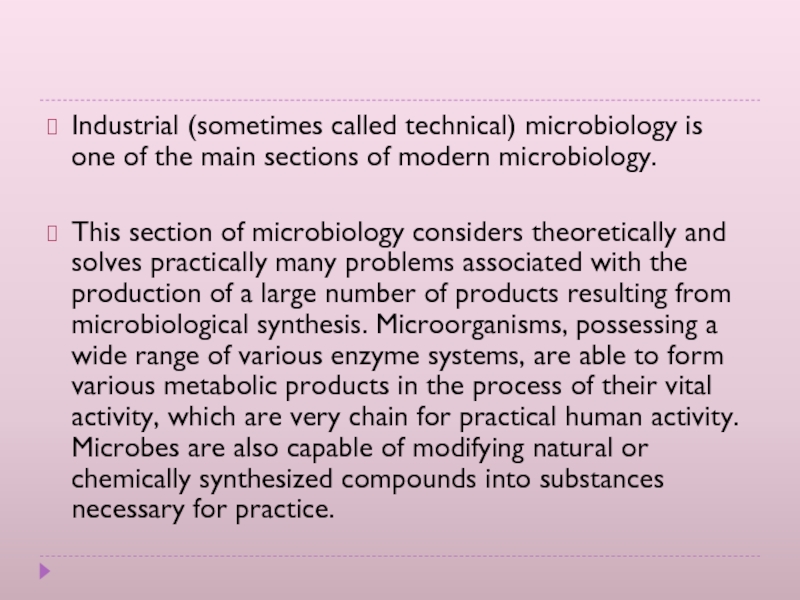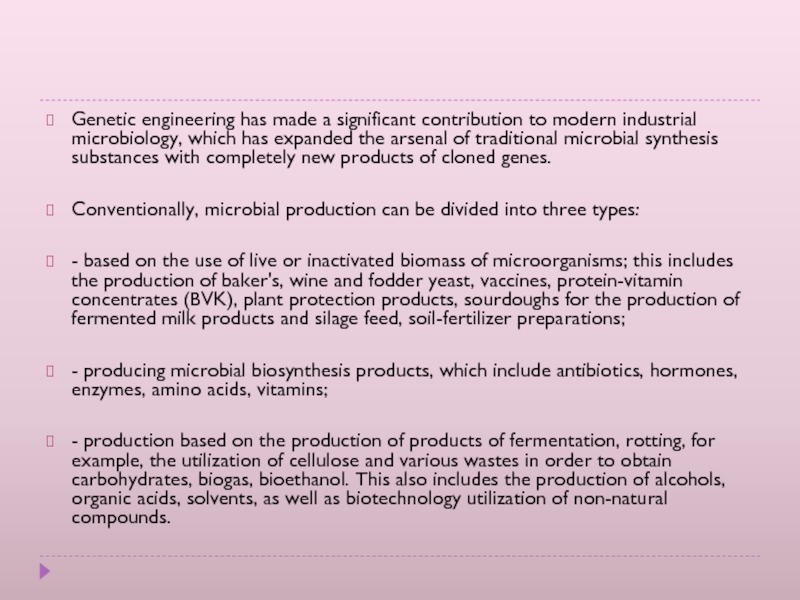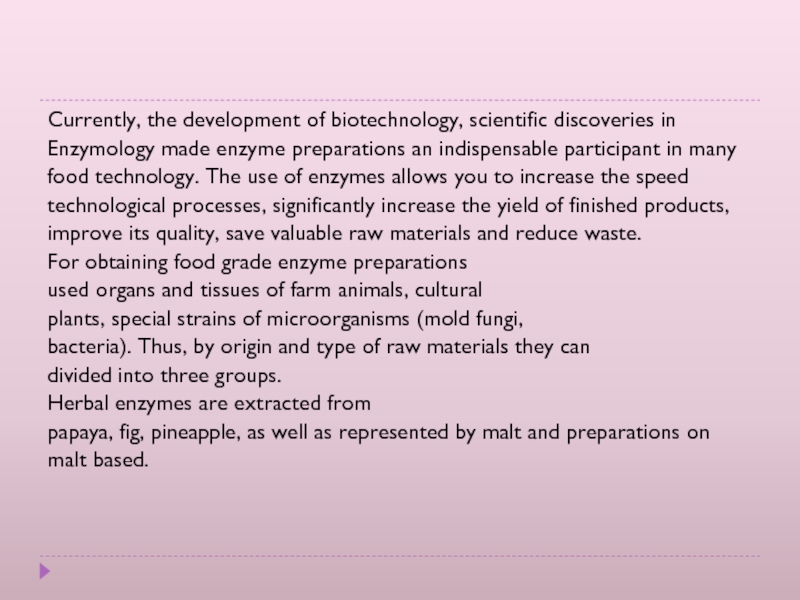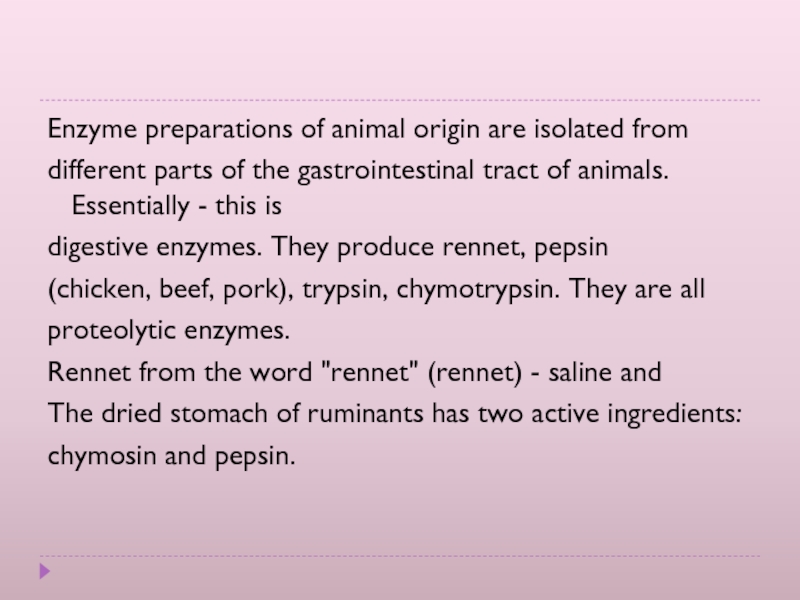Разделы презентаций
- Разное
- Английский язык
- Астрономия
- Алгебра
- Биология
- География
- Геометрия
- Детские презентации
- Информатика
- История
- Литература
- Математика
- Медицина
- Менеджмент
- Музыка
- МХК
- Немецкий язык
- ОБЖ
- Обществознание
- Окружающий мир
- Педагогика
- Русский язык
- Технология
- Физика
- Философия
- Химия
- Шаблоны, картинки для презентаций
- Экология
- Экономика
- Юриспруденция
Industrial microorganisms. Microbiological enzyme systems for industrial
Содержание
- 1. Industrial microorganisms. Microbiological enzyme systems for industrial
- 2. Industrial microbiology is the science of the
- 3. Industrial (sometimes called technical) microbiology is one
- 4. Genetic engineering has made a significant contribution
- 5. Currently, the development of biotechnology, scientific discoveries
- 6. Enzyme preparations of animal origin are isolated
- 7. Microbial enzyme preparations are obtained bycultivation of
- 8. Enzyme preparations are actively used in obtainingfruit
- 9. Скачать презентанцию
Industrial microbiology is the science of the most important microbiological processes and their practical application to obtain valuable products of microorganisms and their biomass as the most important protein product in
Слайды и текст этой презентации
Слайд 1Industrial microorganisms. Microbiological enzyme systems for industrial processes.
Дәулет Мадина
Жанжигитова Ақерке
Данабай
Гүлнұр
Слайд 2Industrial microbiology is the science of the most important microbiological
processes and their practical application to obtain valuable products of
microorganisms and their biomass as the most important protein product in an industrial way, to obtain individual nutrients (drugs) used in various sectors of the national economy and medicine. The basis of this science is microbiological technology (biotechnology), which is the embodiment of the results of basic research on the physiology, biochemistry and genetics of microorganisms in practice.Слайд 3Industrial (sometimes called technical) microbiology is one of the main
sections of modern microbiology.
This section of microbiology considers theoretically and
solves practically many problems associated with the production of a large number of products resulting from microbiological synthesis. Microorganisms, possessing a wide range of various enzyme systems, are able to form various metabolic products in the process of their vital activity, which are very chain for practical human activity. Microbes are also capable of modifying natural or chemically synthesized compounds into substances necessary for practice.Слайд 4Genetic engineering has made a significant contribution to modern industrial
microbiology, which has expanded the arsenal of traditional microbial synthesis
substances with completely new products of cloned genes.Conventionally, microbial production can be divided into three types:
- based on the use of live or inactivated biomass of microorganisms; this includes the production of baker's, wine and fodder yeast, vaccines, protein-vitamin concentrates (BVK), plant protection products, sourdoughs for the production of fermented milk products and silage feed, soil-fertilizer preparations;
- producing microbial biosynthesis products, which include antibiotics, hormones, enzymes, amino acids, vitamins;
- production based on the production of products of fermentation, rotting, for example, the utilization of cellulose and various wastes in order to obtain carbohydrates, biogas, bioethanol. This also includes the production of alcohols, organic acids, solvents, as well as biotechnology utilization of non-natural compounds.
Слайд 5Currently, the development of biotechnology, scientific discoveries in
Enzymology made enzyme
preparations an indispensable participant in many
food technology. The use of
enzymes allows you to increase the speedtechnological processes, significantly increase the yield of finished products,
improve its quality, save valuable raw materials and reduce waste.
For obtaining food grade enzyme preparations
used organs and tissues of farm animals, cultural
plants, special strains of microorganisms (mold fungi,
bacteria). Thus, by origin and type of raw materials they can
divided into three groups.
Herbal enzymes are extracted from
papaya, fig, pineapple, as well as represented by malt and preparations on
malt based.
Слайд 6Enzyme preparations of animal origin are isolated from
different parts of
the gastrointestinal tract of animals. Essentially - this is
digestive enzymes.
They produce rennet, pepsin(chicken, beef, pork), trypsin, chymotrypsin. They are all
proteolytic enzymes.
Rennet from the word "rennet" (rennet) - saline and
The dried stomach of ruminants has two active ingredients:
chymosin and pepsin.
Слайд 7Microbial enzyme preparations are obtained by
cultivation of specific microorganisms capable
of producing
certain enzymes. Currently, most enzymes in
industries are produced using
bacteria and molds inspecial apparatus bioreactors (fermenters) in tightly controlled
conditions. There are bacterial enzyme preparations obtained
by deep cultivation of bacteria, and fungal, obtained by
surface cultivation of microscopic fungi.
Слайд 8Enzyme preparations are actively used in obtaining
fruit and vegetable juices,
soft drinks, production
protein hydrolysates, invert syrup, egg powder, chocolate, cocoa,
coffee,
pectin, seasonings, flavoring products, etc. Important andThe promising area of application of enzyme preparations is
catering: the production of ready meals, culinary products,
semi-finished products.



























